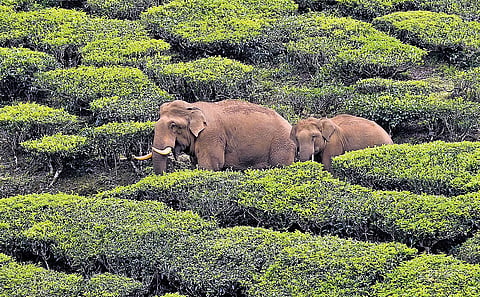

KOCHI: On a day the news broke of another tribal man being trampled to death by a wild elephant in Wayanad — the fourth such death in the state in 48 hours — a high-level meeting of the forest department chalked out a 10-point action plan to mitigate human-wildlife conflict.
Considering the gravity of the situation, the services of employees from the social forestry wing will be used to coordinate conflict mitigation measures. Patrolling will be strengthened and vista clearance will be undertaken on either sides of forest roads. Also, modern cameras will be installed at conflict hotspots for real-time monitoring.
In the second wild elephant attack death in consecutive days in Wayanad, Balakrishnan, 27, of the Kattunayakan commuity, was killed near Erattukundu tribal settlement in Attamala on Tuesday. His body was found on Wednesday. On Monday, Manu, a 45-year-old tribal man, was killed by a wild jumbo in Noolpuzha. The rampant animal attacks have triggered protests in the district, with UDF calling a 12-hour hartal in Wayanad on Thursday.
As part of human-wildlife conflict mitigation efforts, the forest department will issue notices to owners of estates on forest fringes to remove the overgrowth immediately.
Cameras to be installed for real-time monitoring
Directions have been issued to range officers to conduct vista clearance on either side of the roads passing through forest stretches. A real-time monitoring system will be launched by installing cameras to monitor the movement of wild animals near human habitations.
The meeting also decided to provide modern equipment to the 28 Rapid Response Teams (RRTs) deployed in conflict zones. A proposal has been submitted to the state disaster management authority to allocate fund for the project.
Primary Response Teams will be formed in all conflict hot spots, with local residents as volunteers. The teams will alert the public about the presence of wild animals in their areas, without waiting for the arrival of RRTs.
The department will launch ‘Mission Tribal Knowledge’ to study the traditional methods employed by the 36 tribal communities in the state to mitigate human-wildlife conflict. The project will be implemented with the support of Kerala Forest Research Institute.
In an attempt to restore the wildlife habitat, ‘Mission Food, Fodder and Water’ will be implemented. Also, steps will be taken to rejuvenate the water sources in forests, including check dams and ponds. Invasive plant species will be removed and natural fruit trees will be planted to ensure availability of food for animals inside forest.
Mission Bonnet Macaque to control the monkey menace, Mission Wild pig to control the population of wild pigs in human habitations, Mission Sarpa to reduce death due to snakebite and Mission Knowledge to conduct research in association with leading wildlife institutes to study the behavioural changes of wild animals are the other important proposals in the action plan.